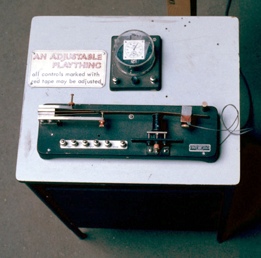 | grows older, it becomes more and more difficult to get people to be playful. Exhibits are now usually made from scratch out of raw stock through elaborate machining and welding, whereas in the early days we improvised by finding something that was made for some other purpose and using it to construct an exhibit. We even set out purposeless exhibits such as a vibrating timer and called it an Adjustable Plaything. But it’s been a long time since we’ve set out an exhibit with no particular purpose in mind. I can only conclude that it must require an inordinate amount of self-discipline for adults to remain playful in their work. It seems to me that although a lot of people do play games together, being genuinely playful is frequently a solitary kind of activity with private justifications that are socially incommunicable. One can never manage to justify any particular act of playfulness, but only recommend the value of playfulness in general. | ||
| had asked many people without getting a very satisfactory answer. I asked, “Are there any things which a young person must learn before it is too late to learn them?” There has been much emphasis on how early a child can learn to write or to spell or to add, but my question seems not to have attracted much attention. There may very well not be anything which one has to learn before it’s too late to do so. But Bob answered, “Maybe people have to learn how to play before it’s too late. “ He said he had observed college students over the years and there seemed to be a large group of them who never played in their studying or in their life, whereas at the other end of the spectrum an equally large group of students were continually playful. The ones who were never playful never seemed to learn how to be playful. It was an interesting answer, I thought, and would bear some looking into, for it is clear that the kind of playing that is so fruitful in art and science and in getting accustomed to life or change is an extremely vital aspect of all human endeavor. If the ability to play is inadvertently denied to a large part of the population, it would be worth finding out why. Certainly, many Exploratorium exhibits have been born of play and have been built so that they can be playful for the people who come here. But even in this enterprise, I’ve noticed that as the staff gets larger and the institution | |||
 | |||